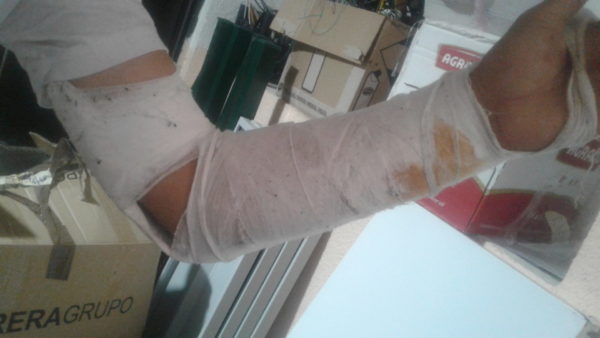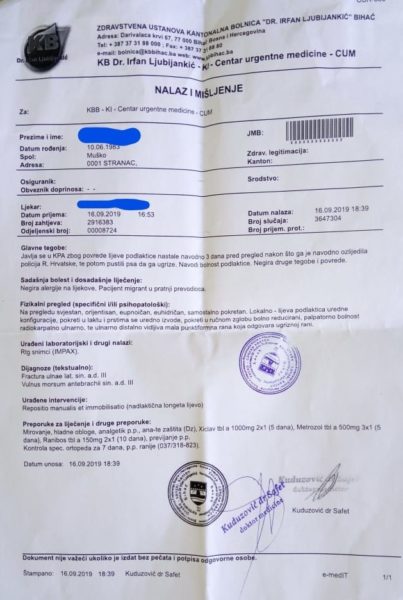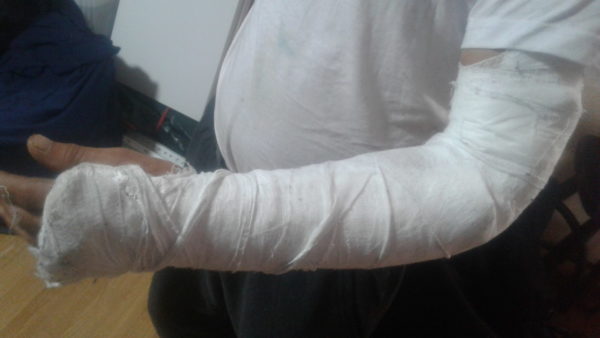When the dogs attack you, the police doesn't stop them. They smile and congratulate them.
| 13.09.2019 | Koranski Lug, Croatia | No Name Kitchen | 45.0442972, 15.7550199 | Croatia | Bosnia | no | no | yes | no | no | no | no | 22 - 37 | 9 | Morocco, Algeria | 6 | beating (with batons/hands/other), kicking, pushing people to the ground, insulting, water immersion, dog attacks, forcing to undress, destruction of personal belongings, theft of personal belongings | 6 Croatian officers of whom at least four were wearing face-masks |
A group of nine young adults, six Moroccan and three Algerian, arrived in Šturlić (BiH) on Thursday 12th September 2019 and waited for the cover of the night to cross the border into Croatia. The following day (13th September 2019), as they walked in the forest in Croatia, approximately 7 km in from the border, two dogs appeared out of nowhere and attacked them, biting one of the men's arm (see Figure 1). In the meantime, six Croatian officers arrived on the scene; two on foot, and four in a van that the interviewee described as a white Croatian police vehicle. The interviewee described how, as the dogs attacked:
[caption id="attachment_13430" align="aligncenter" width="500"]"The police did not say 'stop'. There were two dogs; one had a muzzle, the second didn't. The dogs made us fall on the ground. My friend protected his face with his arm and was bitten by the dog."
 (Figure 1: Picture of injury to the mans arm, incurred from police dog attack)[/caption]
During the apprehension of the nine men, the interviewee described how the Croatian police encouraged the dogs behavior. Stating:
(Figure 1: Picture of injury to the mans arm, incurred from police dog attack)[/caption]
During the apprehension of the nine men, the interviewee described how the Croatian police encouraged the dogs behavior. Stating:
The interviewee explained how the nine men in the group were then assaulted by the police officers. They were each struck several times on their body by the six officers, who wielded batons. After beating them, the officers asked for their bags, their phones, their money and had the men take off their shoes. The officers then burnt all the confiscated shoes, and bags."When the dogs attack you, the police doesn't stop them. They smile and congratulate them."
After this, the transit group was put in the police van which had initially arrived on the scene, and were then driven to the border. The interviewee felt that the drive lasted 25 to 30 minutes. When they arrived at the location, estimated to be near Koranski Lug (Croatia) given the respondent indications on the map, the officers put on face masks and started to kick them with their feet and struck them again with police batons."They take bags and shoes and make a [describes a pile with hand gestures] and burn all [making the gesture of a lighter]."
It was around 17:00 (13th September 2019) when the police officers indicated to them the Korana river separating Croatia and Bosnia and Herzegovina, and ordered them to cross and leave. Barefoot, the group started its way back to Velika Kladuša (BiH), walking slowly because of the pain from their injuries, and without any food owing to the fact it had been taken with their bags and burnt. They finally arrived in Velika Kladuša on 14th September 2019, the day after their pushback. During the following days, the group looked to the help of volunteers to get new clothes, having lost much of theirs to the police when their bags were burnt. They also sought medical assistance for their injuries. The person bitten by the dog was taken to the hospital in Bihać (see Figure 2), and treated there three days after the wound was inflicted. [caption id="attachment_13429" align="aligncenter" width="336"]"We had to go out of the van and run. [There were] two officers on each side. They beat us with batons. They insult us. After we had to walk all night without nothing. No bags, no shoes, no food. They took our money too."
 (Figure 2: Medical record of patient suffering dog attack. Treated at Dr. Irfan Ljubijankic Cantonal Hospital in Bihać on 16th September 2019)[/caption]
According to the medical record (see Figure 2), the injury on his arm matches with the type of wound received from the bite of a police dog, corroborating the testimony of the interviewee, namely that Croatian police had set dogs on the group three days earlier, causing serious injury. Aside from the dog bite, the mans wrist was injured and he suffered reduced mobility. The x-ray at the hospital revealed a fracture (see Figure 3), showing that the strength of the dog bite had broken his bones.
[caption id="attachment_13432" align="aligncenter" width="500"]
(Figure 2: Medical record of patient suffering dog attack. Treated at Dr. Irfan Ljubijankic Cantonal Hospital in Bihać on 16th September 2019)[/caption]
According to the medical record (see Figure 2), the injury on his arm matches with the type of wound received from the bite of a police dog, corroborating the testimony of the interviewee, namely that Croatian police had set dogs on the group three days earlier, causing serious injury. Aside from the dog bite, the mans wrist was injured and he suffered reduced mobility. The x-ray at the hospital revealed a fracture (see Figure 3), showing that the strength of the dog bite had broken his bones.
[caption id="attachment_13432" align="aligncenter" width="500"] (Figure 3: Picture of patient who suffered the dog bite. Photo taken of outer arm, showing bandaging and the wrist splint given to treat the fracture)[/caption]
(Figure 3: Picture of patient who suffered the dog bite. Photo taken of outer arm, showing bandaging and the wrist splint given to treat the fracture)[/caption]
